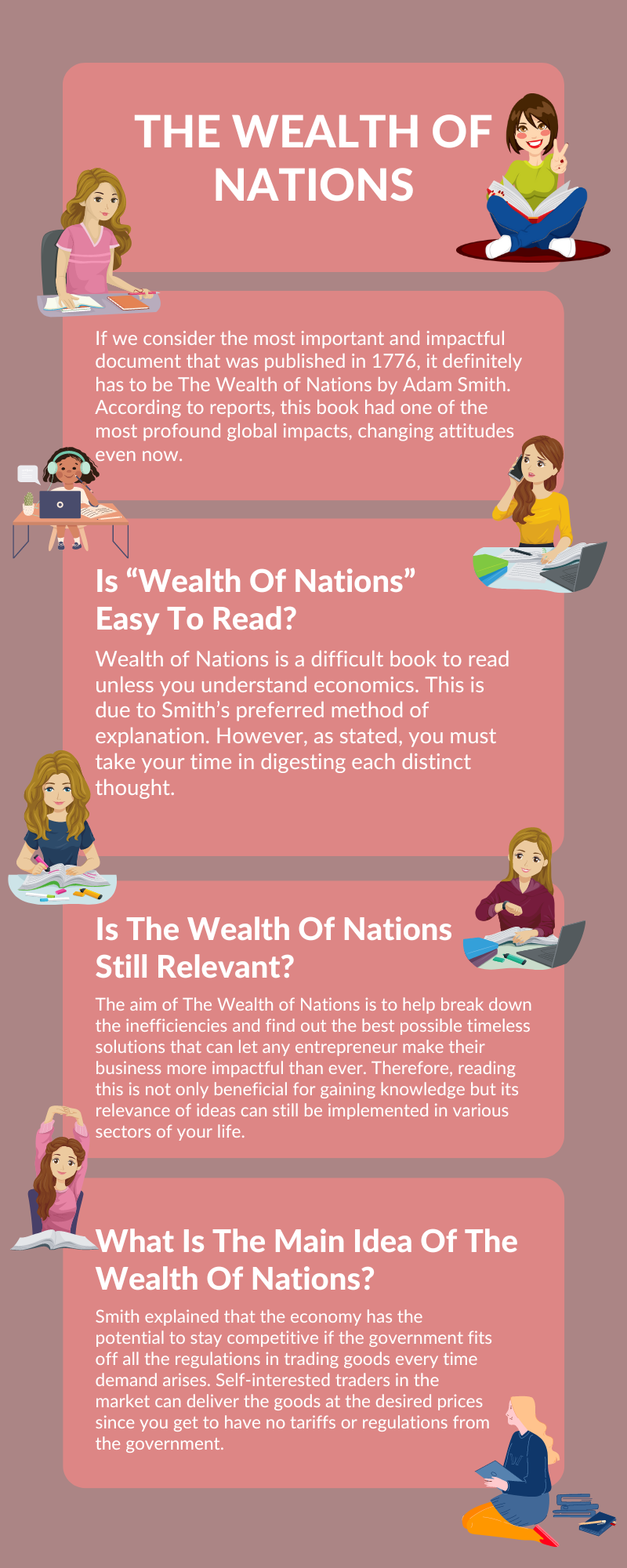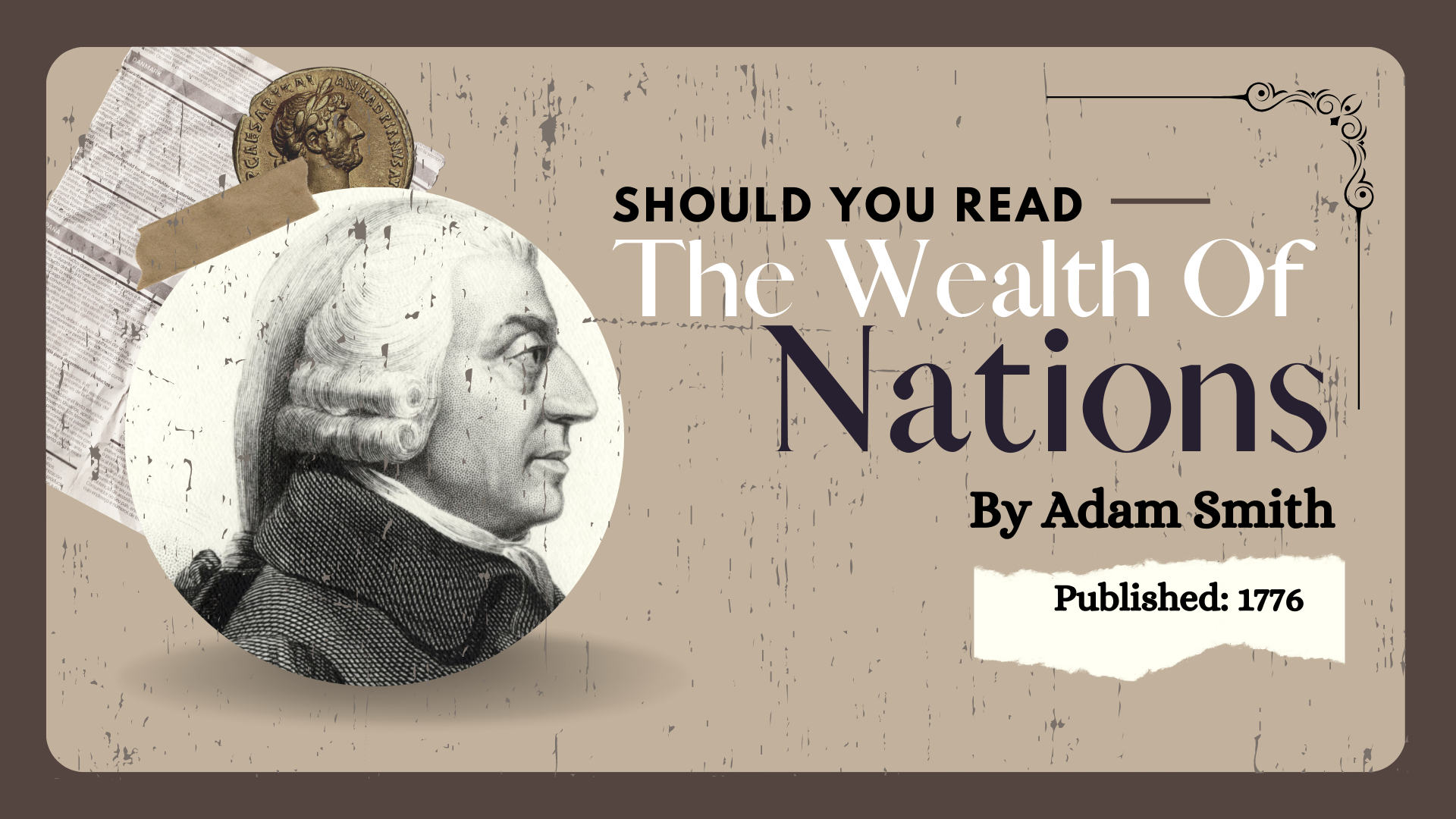If we consider the most important and impactful document that was published in 1776, it definitely has to be The Wealth of Nations by Adam Smith. According to reports, this book had one of the most profound global impacts, changing attitudes even now.
As mentioned by Investopedia.
However, considering the age of the book, the real question is, should I read The Wealth of Nations?
The core themes of Smith’s The Wealth of Nations strive to fulfil self-interest for the social good of individuals and ask thought-provoking issues that can still make a difference today.
Here’s a complete guide to everything you need to know about the Wealth of Nations.
Why Should You Read “The Wealth of Nations?
-
It Talks About the Birth of Free Market
The Wealth of Nations talks about how a free economy is one with no flaws and the key to having freedom where everything will have a significant value without being too worked up by the economy’s flaws. It breaks up the inefficiencies in the market to help you grab an idea of how the general economy works and what can be done to combat the rising issues.
Once you start to read, you will get to understand countless issues that are still haven’t addressed today and their possible solutions with which we can begin. The reason why the book is still worth reading is because it is not just a book about ideology, economics, or policies but about ideas and fundamental concepts.
-
Packed With Ideas for Improvement
By delving into the reasoning behind each purpose and economic focusing technique, you can break past the usual and create solutions that no one knew existed before. Every time you pick this book to read, you can expect to unveil questions that still remain unsolved today and the emphasis on key aspects we need to focus on regardless of the time.
It works by showing you examples of inefficiencies and ways you can combat them. This means, although the book mainly revolves around economics, if you want to understand economics in modern times, this may not be the right choice for you. However, if you want to know how markets work in general and what has led to the market being what it is now, this book will provide you with everything you need.
-
Helps You See Beyond Your Knowledge
As a general rule of thumb, the point of history is to help you see the concerts that existed beyond our current system which brings a unique perspective to solving today’s problems. Flawed or not, that’s a whole another story. Simply learning about the things that used to exist, can open up gates to different possibilities and ideas which are an amalgam of ancient inventions and modern strategies to bring out the best in the system.
Your actions are always limited to your current knowledge, no matter how educated or informed you are. In the book, Smith makes it possible for you to learn from the life experience of others. As a result, you will start to question the wrong and figure out solutions in the most efficient way possible.
-
Talks About the Practical Government Issues
Smith does an excellent job throughout the book of bringing up practical difficulties of governing in 18th-century Britain. Sure, you won’t be interested in what the government was going back then, however, it will help to broaden your mind to unmatched opportunities and ideas that you would have never thought of before.
This is because the way they combat each of the issues helps raise awareness and generate ideas that you can apply to modern-day government problems as well. The best way to read this treasure trove filled with knowledge you have no idea about is to read the first part once, keep it for a month or two, and read it again to discover a whole new world with every re-read.
Another thing covered in the book is how the division of labor can generate exceptional productivity. He does that by breaking production down into many small tasks and using specialized hands to take care of it.This allows you to identify inefficient employees and replace them with more efficient employees or labor-saving machinery, which can prove to be a sensible option in the long term.
He also mentions strictly focusing on enhancing home business rather than overseas business since it will provide a better use of security and generate the best returns. However, this is just the product of the free market which Smith refers to as an “invisible hand”.
-
Use Money To Build
Where many people earn to avail the luxuries of their life, Smith urges you to use the money to help build your bigger. In the book, he mentions various ways you can start to earn income and roll it up, and its multiple effects to earn freedom in life.
Is “Wealth of Nations” Easy To Read?
Wealth of Nations is a difficult book to read unless you understand economics. This is due to Smith’s preferred method of explanation. However, as previously stated, you must take your time in digesting each distinct thought.
A Wealth of Nations is a five-book series with around 586 pages and a small font, making it harder to read for some people.
However, here’s the thing: you know the book goes beyond our current times, which means you barely get to understand half of the concepts mentioned. To read this book, you need to take your time and reread it several times to truly understand and implement its strategies into your life.
However, if you are an avid economics or history reader, there are chances you will be able to understand everything in just a single read.
Is The Wealth of Nations Still Relevant?
Using the word “relevant” here may not be the best way to explain it. Sure, the book goes in-depth into the 18th-century system and talks about government policies, however, this is not the main idea here.
The aim of The Wealth of Nations is to help break down the inefficiencies and find out the best possible timeless solutions that can let any entrepreneur make their business more impactful than ever. Therefore, reading this is not only beneficial for gaining knowledge but its relevance of ideas can still be implemented in various sectors of your life.
Best of all, unlike many other nonfiction books that revolve around the systems of today, this book helps you shift your perspective into a completely different concept and resolve the underlying problems in the most creative way possible.
What Is the Main Idea of the Wealth of Nations?
As someone like Adam Smith, he is the champion of the free market and spent the last years of his life as a Commissioner of customers which led him to be responsible for imposing tariffs. During this time, he’s been known for burning many clothes that were smuggled into the shop from abroad.
The main concept of the book is all about, as briefly mentioned above, an invisible hand. In the book, he states that the economy can work well in a free market where nay can work according to their interest.
How?
He explained that the economy has the potential to stay competitive if the government fits off all the regulations in trading goods every time demand arises. Self-interested traders in the market can deliver the goods at the desired prices since you get to have no tariffs or regulations from the government.
In a free market scenario, you get to have zero restrictions during trading. This means the government won’t interfere in what you do, no tariffs, and you will get to sell goods in the amount you originally intended to. This not just improves demand but has the potential to buy and sell goods without inflation. The customer demand and the seller offer the product all while staying under the same price range.
He suggested that leaving the trading individuals to themselves can let people naturally keep the prices down to stand out against their competitors and inevitably lead to a positive shift in the economy. In these scenarios, traders will charge less and customers will buy at their desired prices with no hassle whatsoever.
The irony here is this concert can still be a powerful source to yield output that was never mentioned before. This excellent idea, when combined with the division of labor can support multi interdependencies which can offer stability and efficiency in the market.
Another thing mentioned here is where in the world silver and gold were considered as actual wealth, Smith diverted the focus from this concept and mentioned that the nation’s wealth is actually the stream of goods and services that it produces every year.
In modern times, we consider this as gross domestic product and Smith argues that this can be further improved if we set it free.
Read More: Is Rich Dad Poor Dad Worth Reading?

















